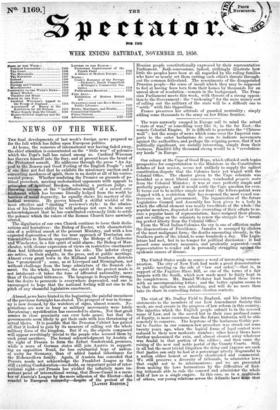NEWS OF THE WEEK.
TEE final developments of last week's foreign news prepared us for the lull which has fallen upon European politics. At home, the rumours of international war having faded away, the chief attention is concentrated on the " little war , ' of polemics which the Pope's bull has raised among us. Cardinal Wiseman has thrown himself into the fray, and at present bears the brunt of -the Protestant assault. He addresses through the press " An Ap- peal to the Reason and Good Feeling of the English People "; and if one does not feel that he exhibits the missionary unction and a tonv.erting meekness of spirit, there is no doubt at all of his contro- versial power: Whether confuting the Premier on grounds of po- litical precedent, meeting ecclesiastical opponents with appeals to principles of epiritual freedom, rebuking a partisan judge, or throwing sarcasm at the " mdiffusive wealth' of a sacred esta- blishment which has become literally hedged from the world by barriers of social depravity, he equally shows his mastery of dia- lectical resource. He proves himself a skilful wielder of the most effective and " slashing" reviewer's style : in the admira- tion of his literary ability he will perhaps not care to miss any .acknowledgment that he has contributed extremely little to settle the polemic which the rulers of the Roman Church have unwisely stirred.
The dignitaries of our own Church continue to issue their decla- rations and hortatives : the Bishop of Exeter, with characteristic aim of a political smack at the peccant Ministry, and with a less expected deprecation of the too near approach of Tractarian sen- timentalities to Bomish superstitions ; the Bishops of Chichester and Winchester, in a fair spirit of mild altp•ra ; the Bishop of Man- _ehester, with clearer expression of views on restrictive enactments than had hitherto' appeared from his side. The inferior clergy are active, in their pulpits, in the press, and at public meetings. Almost every great town in the Midland and Southern districts has " pronounced" • some, as at Liverpool and Birmingham, not without challenge from the large admixture of the Romish ele- ment. On the whole, however, the spirit of the protest made is not intolerant—it takes the tone of affronted nationality, more than of theological bitterness. The language is frequently strong, but the desire to persecute is ever7where deprecated, and one is encouraged to hope that the national feeling will not rise to the -pitch of any shameful legislative enactment.


























